Abstract
1. The effects of ethanol, chloral hydrate and trichloroethanol upon the 5-HT3 receptor have been investigated by use of electrophysiological techniques applied to recombinant 5-HT3 receptor subunits (5-HT3R-A or 5-HT3R-As) expressed in Xenopus laevis oocytes. Additionally, the influence of trichloroethanol upon the specific binding of [3H]-granisetron to membrane preparations of HEK 293 cells stably transfected with the murine 5-HT3R-As subunit and 5-HT3 receptors endogenous to NG 108-15 cell membranes was assessed. 2. Ethanol (30-300 mM), chloral hydrate (1-30 mM) and trichloroethanol (0.3-10 mM), produced a reversible, concentration-dependent, enhancement of 5-HT-mediated currents recorded from oocytes expressing either the 5-HT3R-A, or the 5-HT3R-As subunit. 3. Trichloroethanol (5 mM) produced a parallel leftward shift of the 5-HT concentration-response curve, reducing the EC50 for 5-HT from 1 +/- 0.04 microM (n = 4) to 0.5 +/- 0.01 microM (n = 4) for oocytes expressing the 5-HT3R-A. A similar shift, from 2.1 +/- 0.05 microM (n = 11) to 1.3 +/- 0.1 microM (n = 4), was observed in oocytes expressing the 5-HT3R-As subunit. Trichloroethanol (5 mM) had little or no effect upon the maximum current produced by 5-HT for either recombinant receptor. 4. Trichloroethanol (5 mM) similarly reduced the EC50 for 2-methyl-5-HT from 13 +/- 0.4 microM (n = 4) to 4.6 +/- 0.2 microM (n = 4) and from 15 +/- 2 microM (n = 4) to 5 +/- 0.4 microM (n = 4) for oocytes expressing the 5-HT3R-A and 5-HT3R-As subunit respectively. Additionally, trichloroethanol (5 mM) produced a clear enhancement of the maximal current to 2-methyl-5-HT (expressed as a percentage of the maximal current to 5-HT) from 63 +/- 0.7% (n = 4) to 101 +/- 1.6% (n = 4) and from 9 +/- 0.2% (n = 4) to 74 +/- 2% (n = 4) for oocytes expressing the 5-HT3R-A and 5-HT3R-As subunit respectively. 5. Trichloroethanol (2.5 mM) had no effect upon the Kd, or Bmax, of specific [3H]-granisetron binding to membrane homogenates of NG 108-15 cells or HEK 293 cells. Similarly, competition for [3H]-granisetron binding by the 5-HT3 receptor antagonists ondansetron and tropisetron was unaffected. However, competition for [3H]-granisetron binding by the 5-HT3 receptor agonists, 5-HT, 2-methyl-5-HT and phenylbiguanide was enhanced by trichloroethanol (2.5 mM).(ABSTRACT TRUNCATED AT 400 WORDS)
Full text
PDF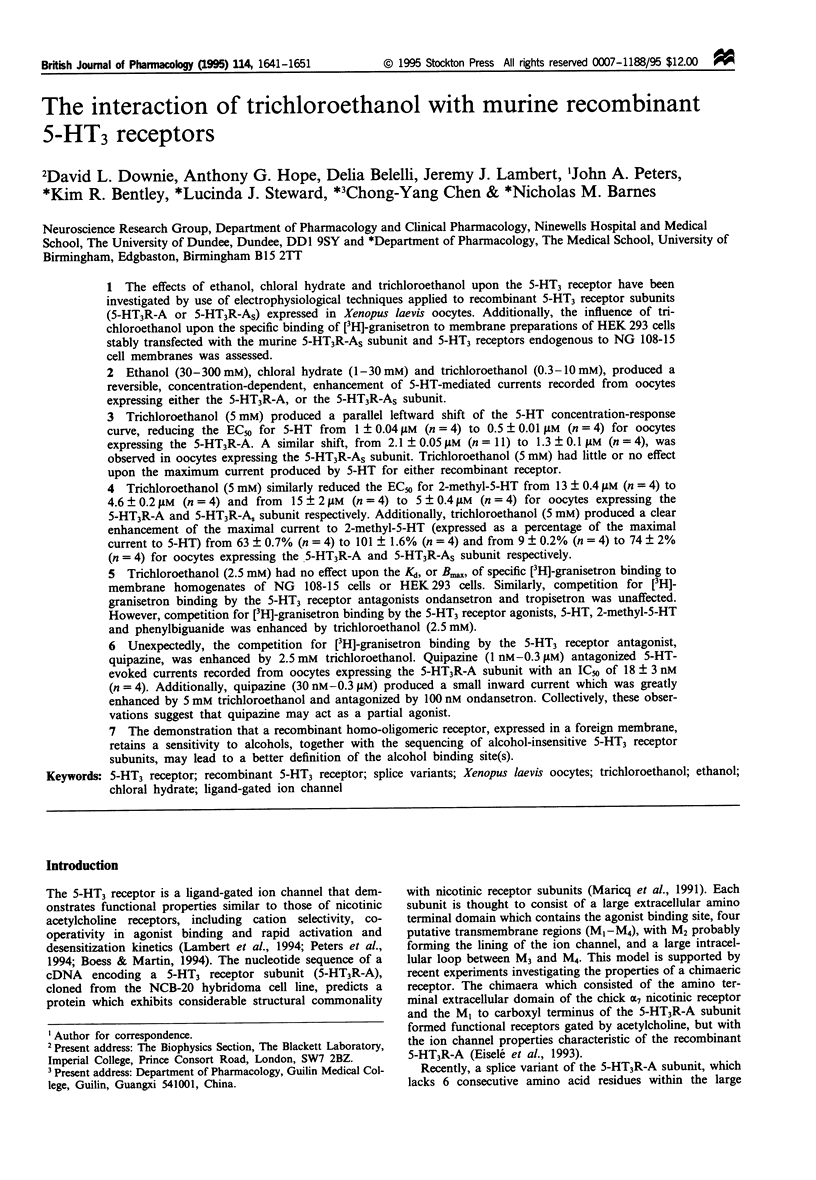
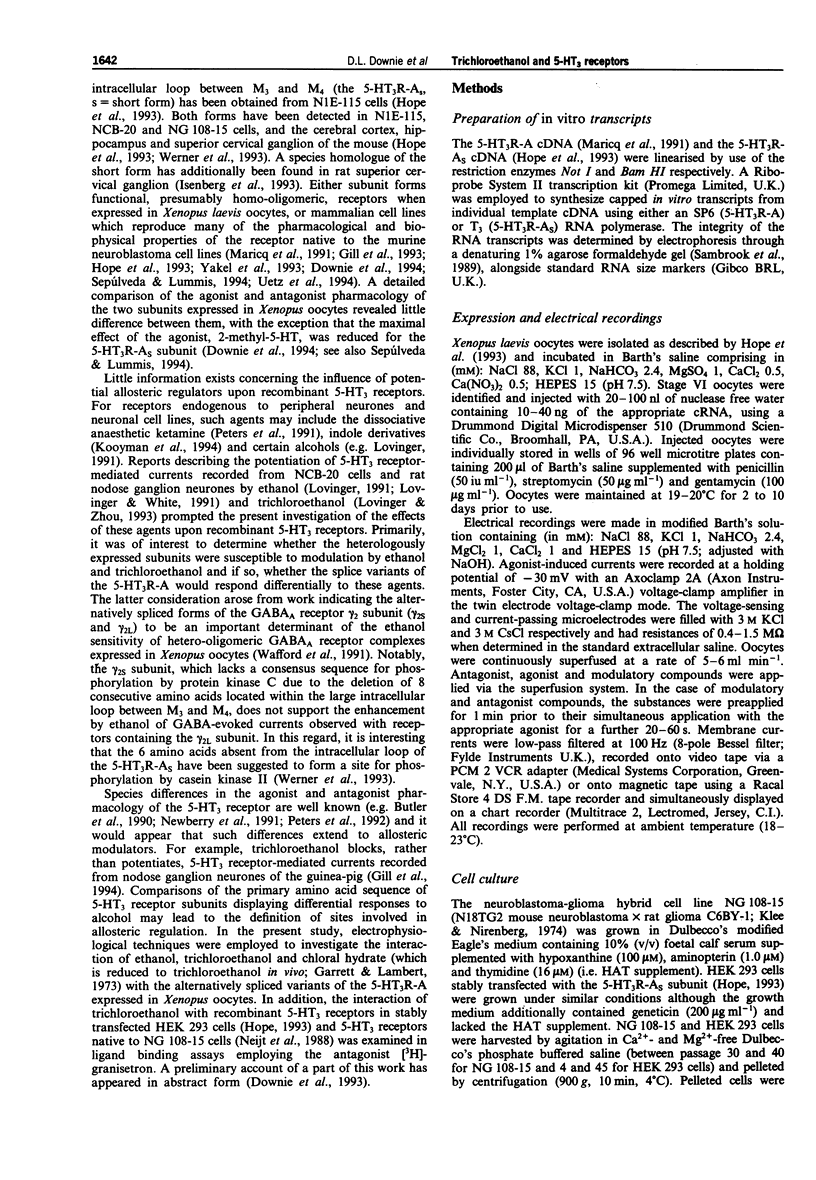
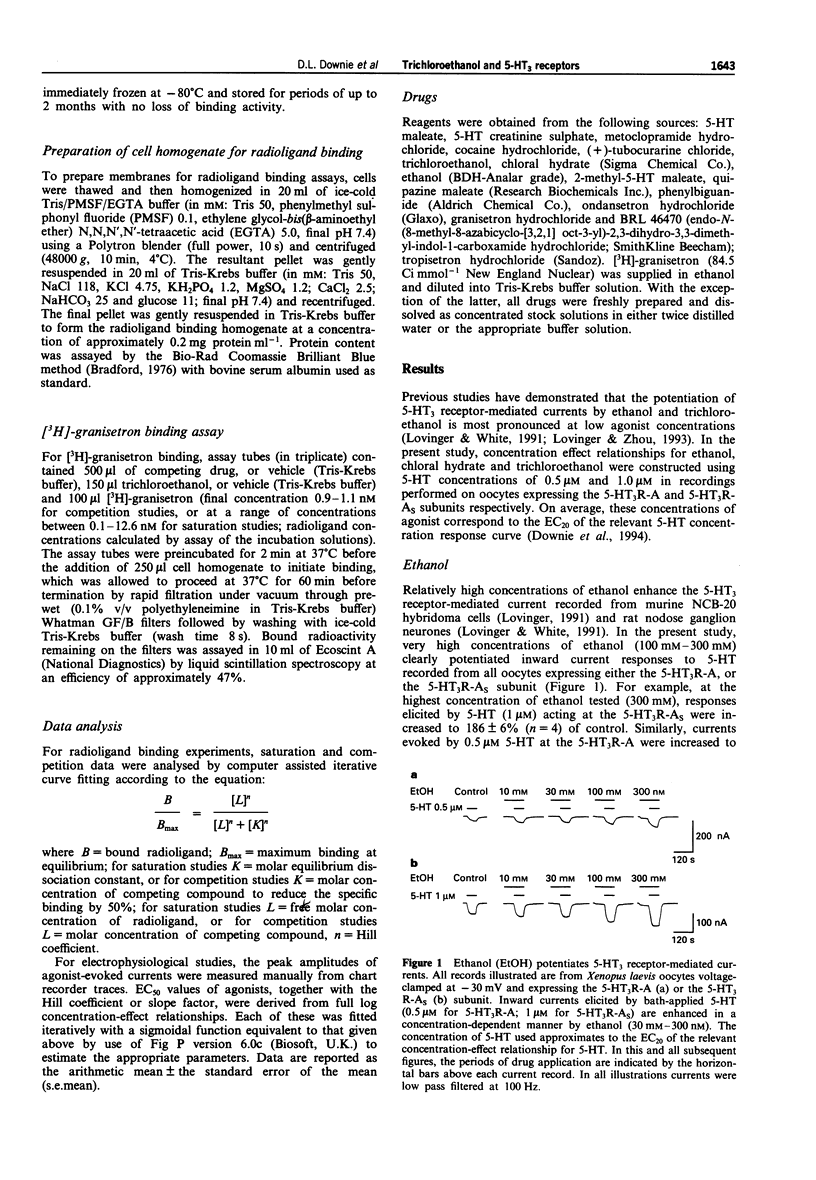
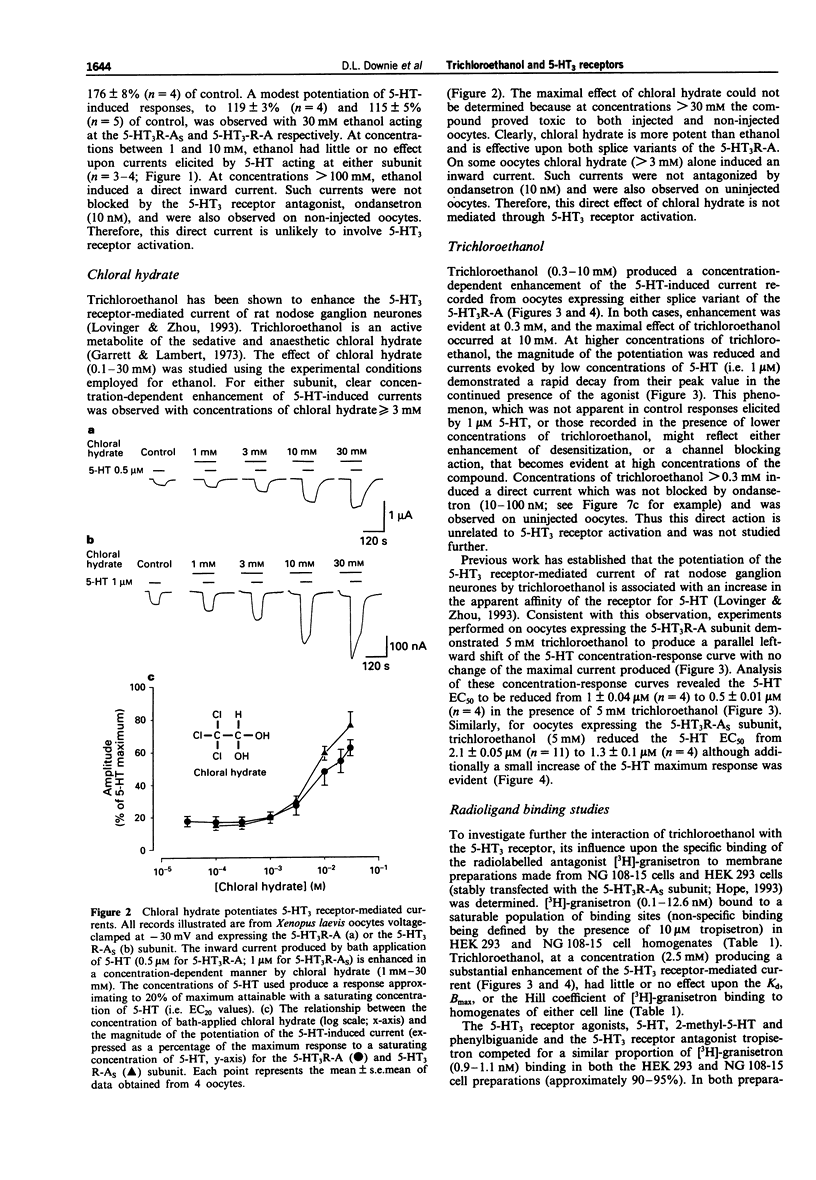
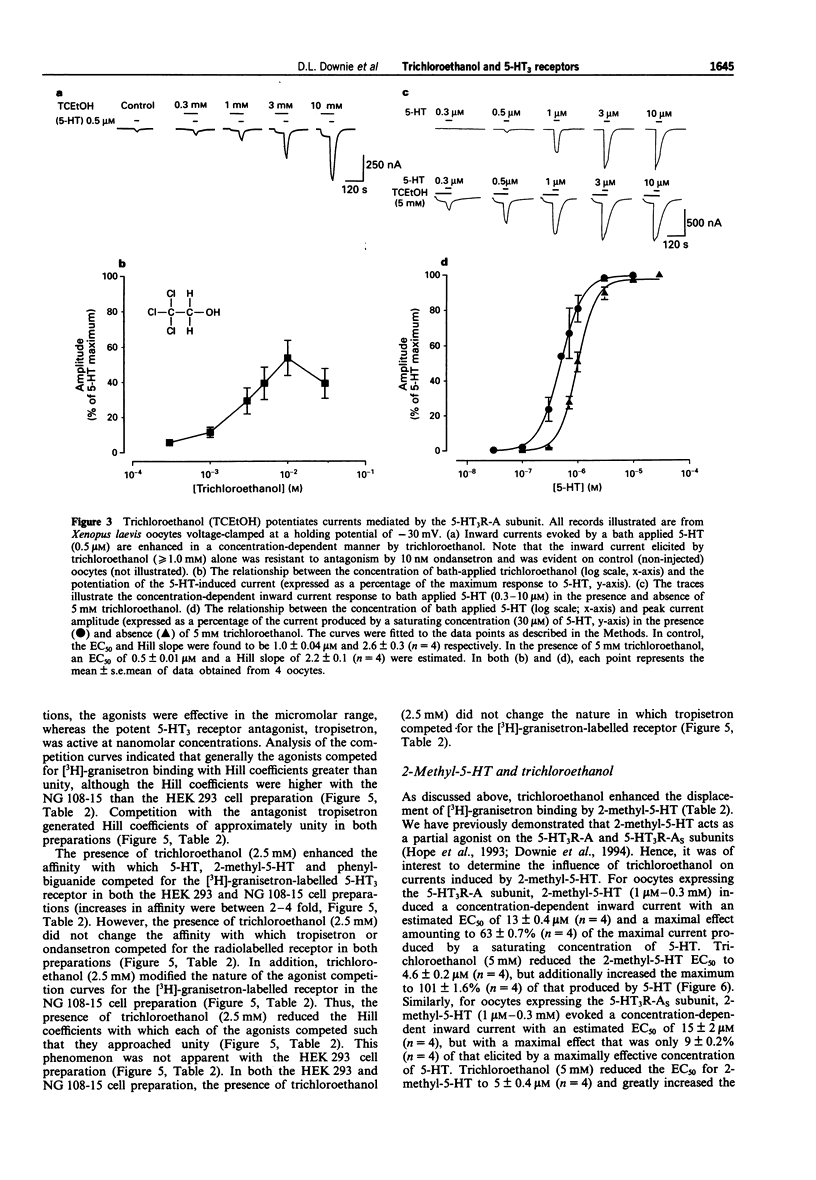
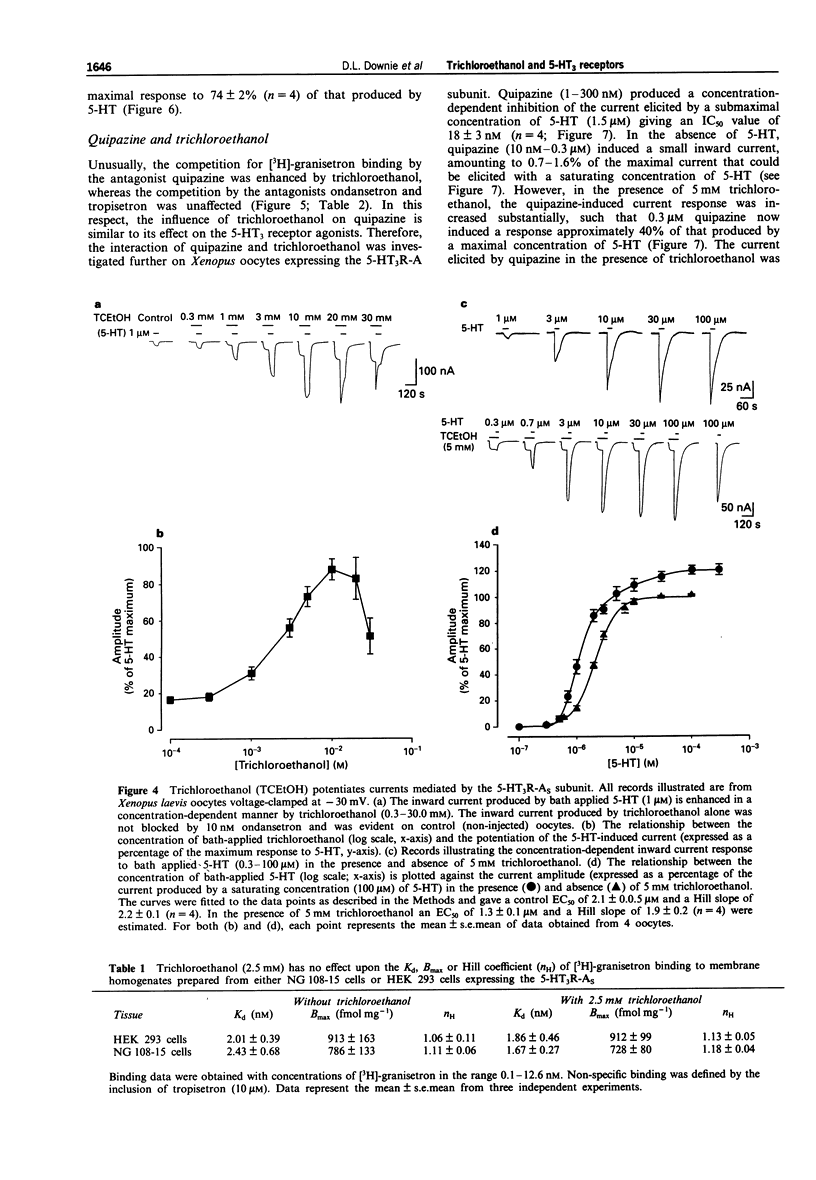
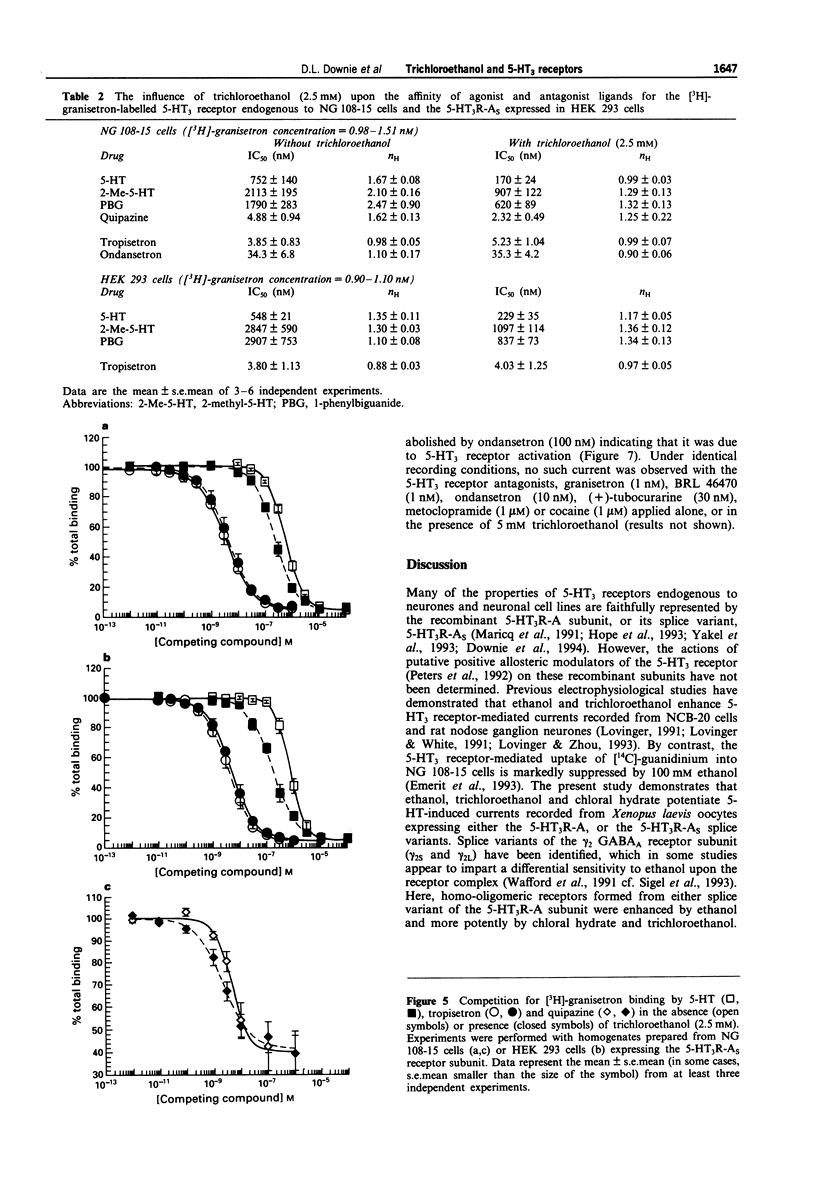
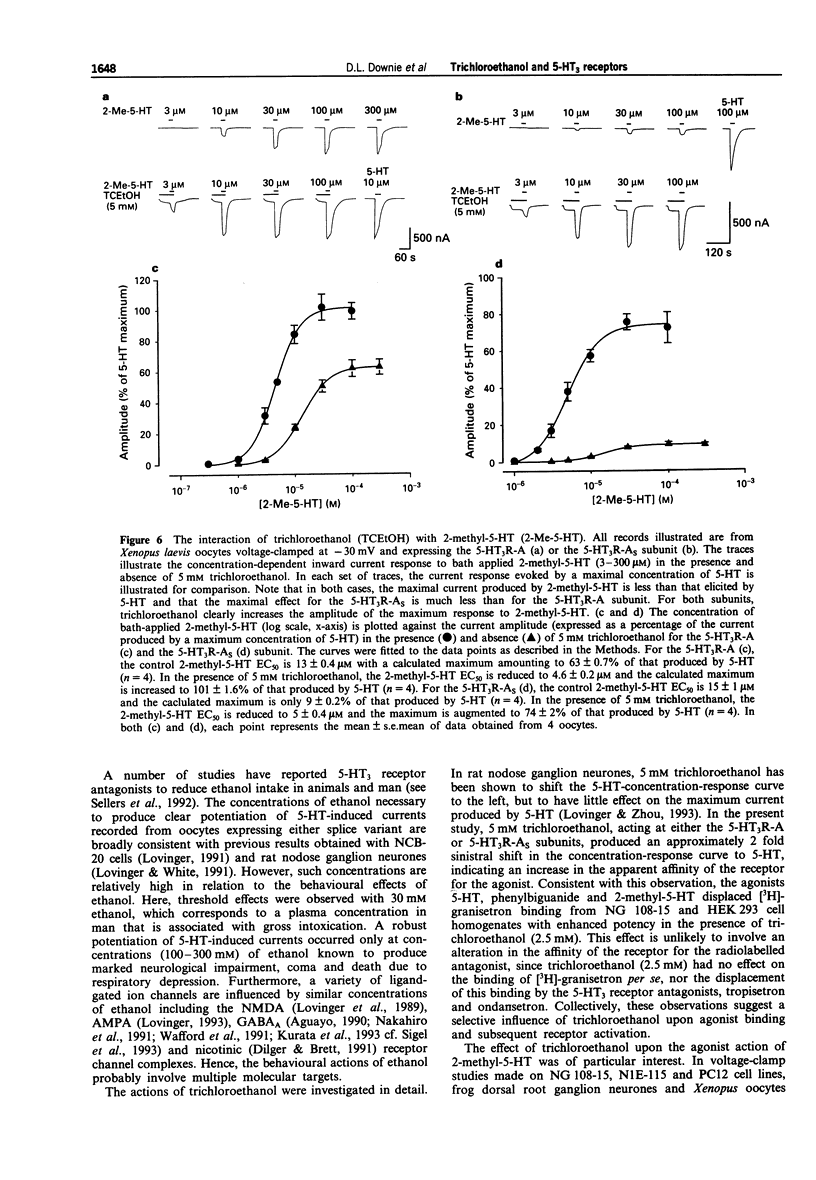
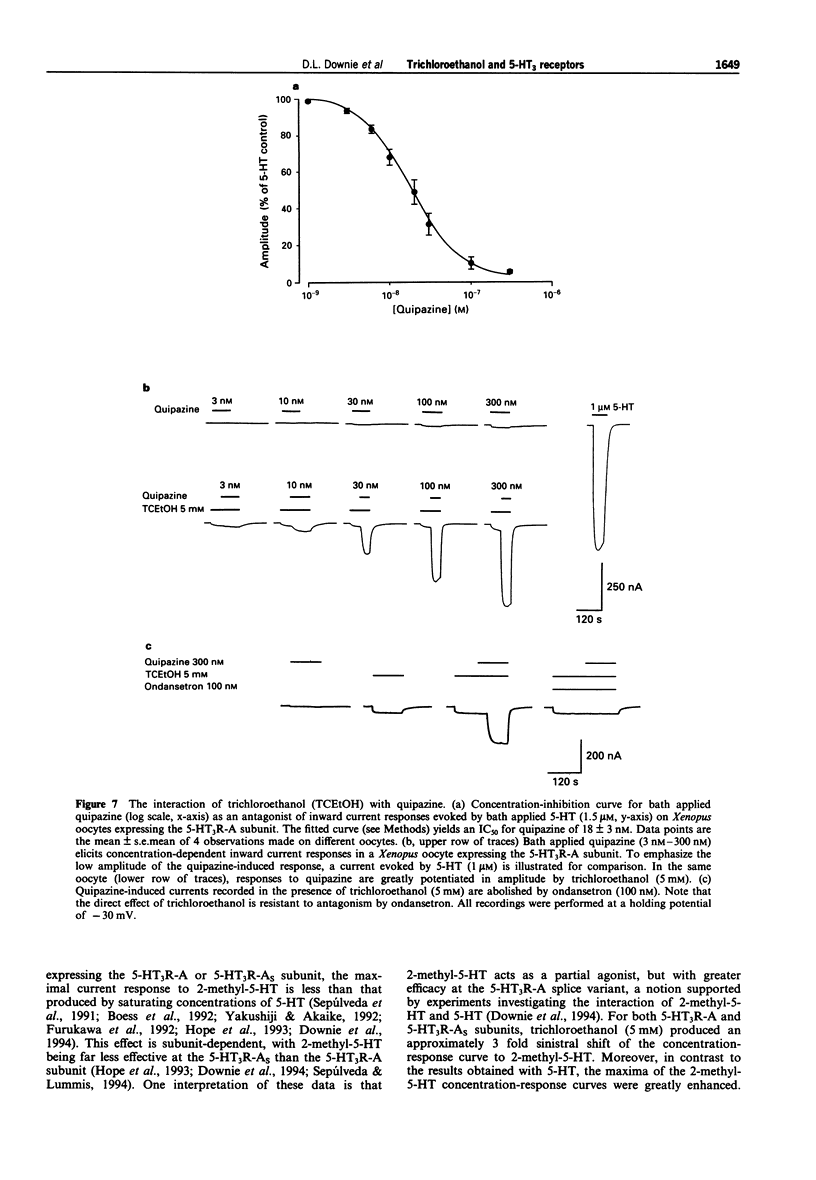
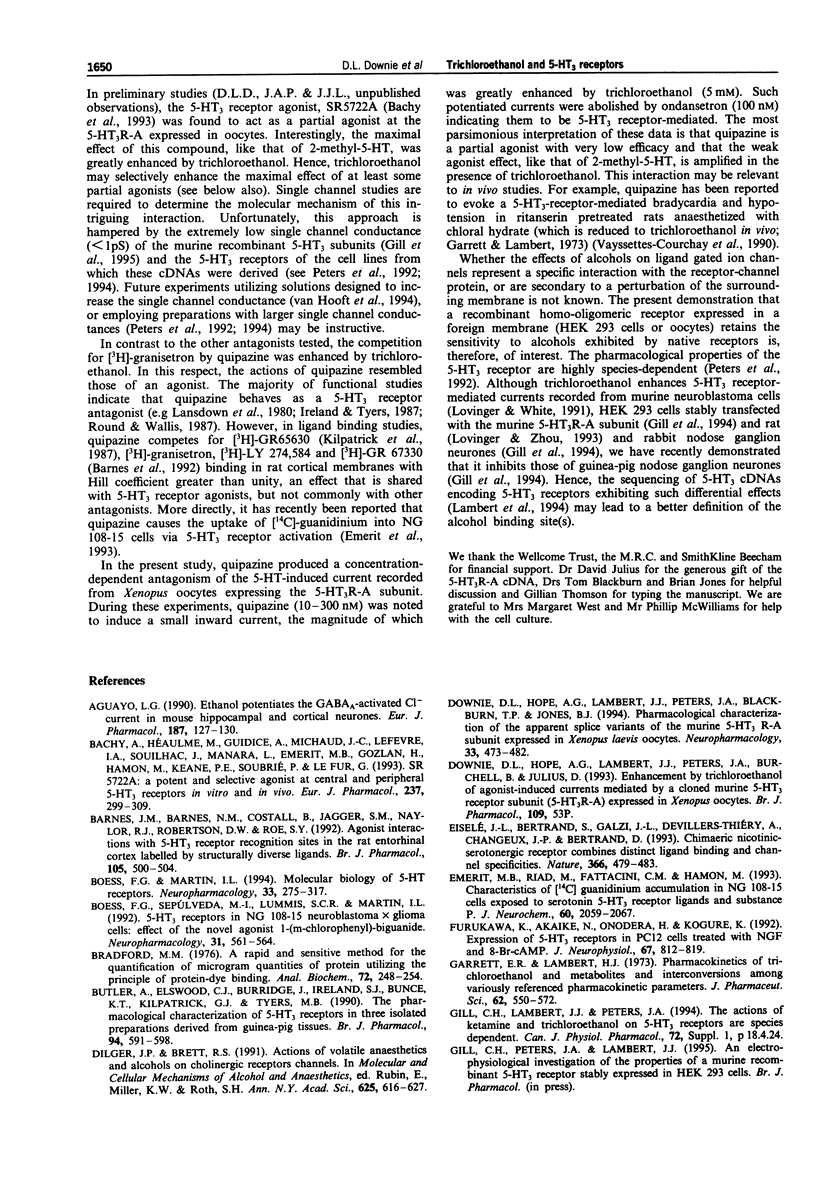
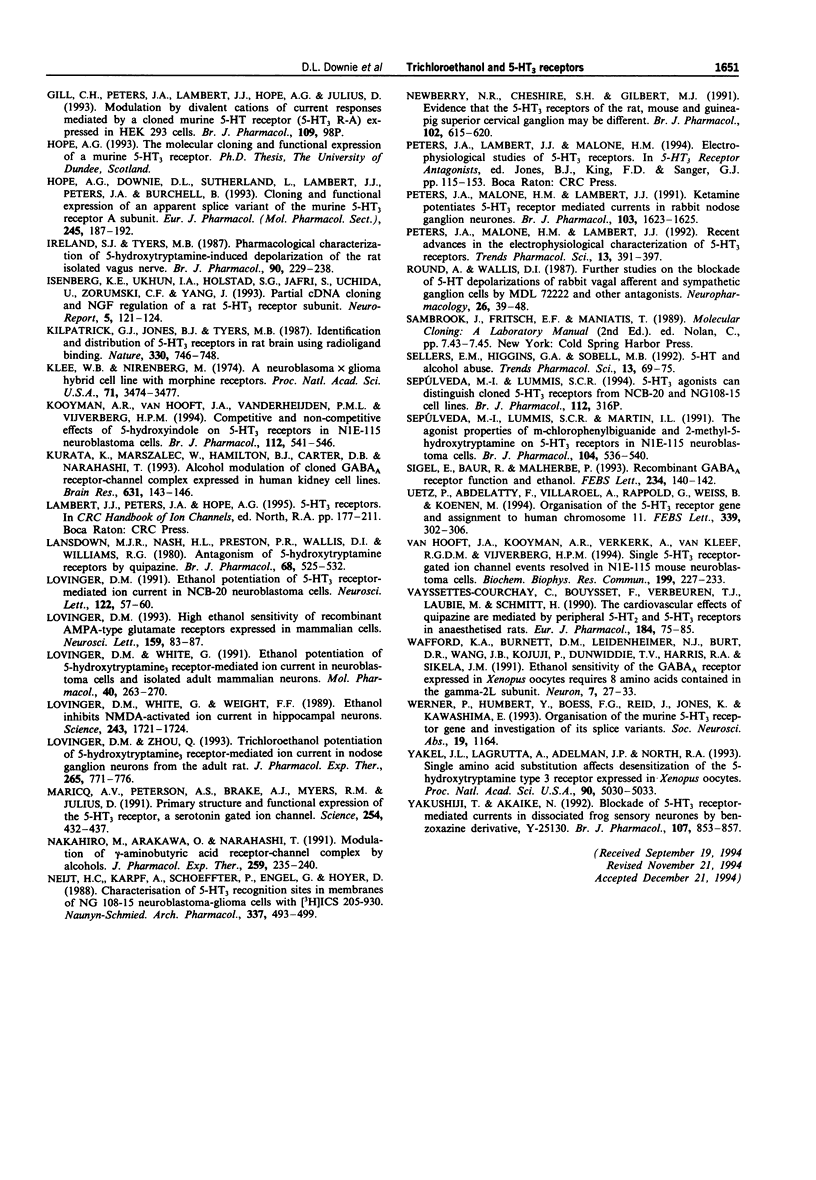
Selected References
These references are in PubMed. This may not be the complete list of references from this article.
- Aguayo L. G. Ethanol potentiates the GABAA-activated Cl- current in mouse hippocampal and cortical neurons. Eur J Pharmacol. 1990 Oct 2;187(1):127–130. doi: 10.1016/0014-2999(90)90349-b. [DOI] [PubMed] [Google Scholar]
- Bachy A., Héaulme M., Giudice A., Michaud J. C., Lefevre I. A., Souilhac J., Manara L., Emerit M. B., Gozlan H., Hamon M. SR 57227A: a potent and selective agonist at central and peripheral 5-HT3 receptors in vitro and in vivo. Eur J Pharmacol. 1993 Jun 24;237(2-3):299–309. doi: 10.1016/0014-2999(93)90282-m. [DOI] [PubMed] [Google Scholar]
- Barnes J. M., Barnes N. M., Costall B., Jagger S. M., Naylor R. J., Robertson D. W., Roe S. Y. Agonist interactions with 5-HT3 receptor recognition sites in the rat entorhinal cortex labelled by structurally diverse radioligands. Br J Pharmacol. 1992 Feb;105(2):500–504. doi: 10.1111/j.1476-5381.1992.tb14283.x. [DOI] [PMC free article] [PubMed] [Google Scholar]
- Boess F. G., Martin I. L. Molecular biology of 5-HT receptors. Neuropharmacology. 1994 Mar-Apr;33(3-4):275–317. doi: 10.1016/0028-3908(94)90059-0. [DOI] [PubMed] [Google Scholar]
- Boess F. G., Sepúlveda M. I., Lummis S. C., Martin I. L. 5-HT3 receptors in NG108-15 neuroblastoma x glioma cells: effect of the novel agonist 1-(m-chlorophenyl)-biguanide. Neuropharmacology. 1992 Jun;31(6):561–564. doi: 10.1016/0028-3908(92)90188-u. [DOI] [PubMed] [Google Scholar]
- Bradford M. M. A rapid and sensitive method for the quantitation of microgram quantities of protein utilizing the principle of protein-dye binding. Anal Biochem. 1976 May 7;72:248–254. doi: 10.1006/abio.1976.9999. [DOI] [PubMed] [Google Scholar]
- Butler A., Elswood C. J., Burridge J., Ireland S. J., Bunce K. T., Kilpatrick G. J., Tyers M. B. The pharmacological characterization of 5-HT3 receptors in three isolated preparations derived from guinea-pig tissues. Br J Pharmacol. 1990 Nov;101(3):591–598. doi: 10.1111/j.1476-5381.1990.tb14126.x. [DOI] [PMC free article] [PubMed] [Google Scholar]
- Dilger J. P., Brett R. S. Actions of volatile anesthetics and alcohols on cholinergic receptor channels. Ann N Y Acad Sci. 1991;625:616–627. doi: 10.1111/j.1749-6632.1991.tb33896.x. [DOI] [PubMed] [Google Scholar]
- Downie D. L., Hope A. G., Lambert J. J., Peters J. A., Blackburn T. P., Jones B. J. Pharmacological characterization of the apparent splice variants of the murine 5-HT3 R-A subunit expressed in Xenopus laevis oocytes. Neuropharmacology. 1994 Mar-Apr;33(3-4):473–482. doi: 10.1016/0028-3908(94)90078-7. [DOI] [PubMed] [Google Scholar]
- Eiselé J. L., Bertrand S., Galzi J. L., Devillers-Thiéry A., Changeux J. P., Bertrand D. Chimaeric nicotinic-serotonergic receptor combines distinct ligand binding and channel specificities. Nature. 1993 Dec 2;366(6454):479–483. doi: 10.1038/366479a0. [DOI] [PubMed] [Google Scholar]
- Emerit M. B., Riad M., Fattaccini C. M., Hamon M. Characteristics of [14C]guanidinium accumulation in NG 108-15 cells exposed to serotonin 5-HT3 receptor ligands and substance P. J Neurochem. 1993 Jun;60(6):2059–2067. doi: 10.1111/j.1471-4159.1993.tb03490.x. [DOI] [PubMed] [Google Scholar]
- Furukawa K., Akaike N., Onodera H., Kogure K. Expression of 5-HT3 receptors in PC12 cells treated with NGF and 8-Br-cAMP. J Neurophysiol. 1992 Apr;67(4):812–819. doi: 10.1152/jn.1992.67.4.812. [DOI] [PubMed] [Google Scholar]
- Garrett E. R., Lambert H. J. Pharmacokinetics of trichloroethanol and metabolites and interconversions among variously referenced pharmacokinetic parameters. J Pharm Sci. 1973 Apr;62(4):550–572. doi: 10.1002/jps.2600620404. [DOI] [PubMed] [Google Scholar]
- Garssen J., Van Loveren H., Gierveld C. M., Van der Vliet H., Nijkamp F. P. Functional characterization of muscarinic receptors in murine airways. Br J Pharmacol. 1993 May;109(1):53–60. doi: 10.1111/j.1476-5381.1993.tb13530.x. [DOI] [PMC free article] [PubMed] [Google Scholar]
- Hope A. G., Downie D. L., Sutherland L., Lambert J. J., Peters J. A., Burchell B. Cloning and functional expression of an apparent splice variant of the murine 5-HT3 receptor A subunit. Eur J Pharmacol. 1993 Apr 15;245(2):187–192. doi: 10.1016/0922-4106(93)90128-v. [DOI] [PubMed] [Google Scholar]
- Hosseinzadeh H., Stone T. W. The effect of calcium removal on the suppression by adenosine of epileptiform activity in the hippocampus: demonstration of desensitization. Br J Pharmacol. 1994 May;112(1):316–322. doi: 10.1111/j.1476-5381.1994.tb13071.x. [DOI] [PMC free article] [PubMed] [Google Scholar]
- Ireland S. J., Tyers M. B. Pharmacological characterization of 5-hydroxytryptamine-induced depolarization of the rat isolated vagus nerve. Br J Pharmacol. 1987 Jan;90(1):229–238. doi: 10.1111/j.1476-5381.1987.tb16844.x. [DOI] [PMC free article] [PubMed] [Google Scholar]
- Isenberg K. E., Ukhun I. A., Holstad S. G., Jafri S., Uchida U., Zorumski C. F., Yang J. Partial cDNA cloning and NGF regulation of a rat 5-HT3 receptor subunit. Neuroreport. 1993 Nov 18;5(2):121–124. doi: 10.1097/00001756-199311180-00006. [DOI] [PubMed] [Google Scholar]
- Kilpatrick G. J., Jones B. J., Tyers M. B. Identification and distribution of 5-HT3 receptors in rat brain using radioligand binding. Nature. 1987 Dec 24;330(6150):746–748. doi: 10.1038/330746a0. [DOI] [PubMed] [Google Scholar]
- Klee W. A., Nirenberg M. A neuroblastoma times glioma hybrid cell line with morphine receptors. Proc Natl Acad Sci U S A. 1974 Sep;71(9):3474–3477. doi: 10.1073/pnas.71.9.3474. [DOI] [PMC free article] [PubMed] [Google Scholar]
- Kooyman A. R., van Hooft J. A., Vanderheijden P. M., Vijverberg H. P. Competitive and non-competitive effects of 5-hydroxyindole on 5-HT3 receptors in N1E-115 neuroblastoma cells. Br J Pharmacol. 1994 Jun;112(2):541–546. doi: 10.1111/j.1476-5381.1994.tb13107.x. [DOI] [PMC free article] [PubMed] [Google Scholar]
- Kurata Y., Marszalec W., Hamilton B. J., Carter D. B., Narahashi T. Alcohol modulation of cloned GABAA receptor-channel complex expressed in human kidney cell lines. Brain Res. 1993 Dec 17;631(1):143–146. doi: 10.1016/0006-8993(93)91200-c. [DOI] [PubMed] [Google Scholar]
- Lansdown M. J., Nash H. L., Preston P. R., Wallis D. I., Williams R. G. Antagonism of 5-hydroxytryptamine receptors by quipazine. Br J Pharmacol. 1980 Mar;68(3):525–532. doi: 10.1111/j.1476-5381.1980.tb14568.x. [DOI] [PMC free article] [PubMed] [Google Scholar]
- Lovinger D. M. Ethanol potentiation of 5-HT3 receptor-mediated ion current in NCB-20 neuroblastoma cells. Neurosci Lett. 1991 Jan 14;122(1):57–60. doi: 10.1016/0304-3940(91)90192-v. [DOI] [PubMed] [Google Scholar]
- Lovinger D. M. High ethanol sensitivity of recombinant AMPA-type glutamate receptors expressed in mammalian cells. Neurosci Lett. 1993 Sep 3;159(1-2):83–87. doi: 10.1016/0304-3940(93)90804-t. [DOI] [PubMed] [Google Scholar]
- Lovinger D. M., White G. Ethanol potentiation of 5-hydroxytryptamine3 receptor-mediated ion current in neuroblastoma cells and isolated adult mammalian neurons. Mol Pharmacol. 1991 Aug;40(2):263–270. [PubMed] [Google Scholar]
- Lovinger D. M., White G., Weight F. F. Ethanol inhibits NMDA-activated ion current in hippocampal neurons. Science. 1989 Mar 31;243(4899):1721–1724. doi: 10.1126/science.2467382. [DOI] [PubMed] [Google Scholar]
- Lovinger D. M., Zhou Q. Trichloroethanol potentiation of 5-hydroxytryptamine3 receptor-mediated ion current in nodose ganglion neurons from the adult rat. J Pharmacol Exp Ther. 1993 May;265(2):771–776. [PubMed] [Google Scholar]
- Maricq A. V., Peterson A. S., Brake A. J., Myers R. M., Julius D. Primary structure and functional expression of the 5HT3 receptor, a serotonin-gated ion channel. Science. 1991 Oct 18;254(5030):432–437. doi: 10.1126/science.1718042. [DOI] [PubMed] [Google Scholar]
- Nakahiro M., Arakawa O., Narahashi T. Modulation of gamma-aminobutyric acid receptor-channel complex by alcohols. J Pharmacol Exp Ther. 1991 Oct;259(1):235–240. [PubMed] [Google Scholar]
- Neijt H. C., Karpf A., Schoeffter P., Engel G., Hoyer D. Characterisation of 5-HT3 recognition sites in membranes of NG 108-15 neuroblastoma-glioma cells with [3H]ICS 205-930. Naunyn Schmiedebergs Arch Pharmacol. 1988 May;337(5):493–499. doi: 10.1007/BF00182721. [DOI] [PubMed] [Google Scholar]
- Newberry N. R., Cheshire S. H., Gilbert M. J. Evidence that the 5-HT3 receptors of the rat, mouse and guinea-pig superior cervical ganglion may be different. Br J Pharmacol. 1991 Mar;102(3):615–620. doi: 10.1111/j.1476-5381.1991.tb12221.x. [DOI] [PMC free article] [PubMed] [Google Scholar]
- Peters J. A., Malone H. M., Lambert J. J. Ketamine potentiates 5-HT3 receptor-mediated currents in rabbit nodose ganglion neurones. Br J Pharmacol. 1991 Jul;103(3):1623–1625. doi: 10.1111/j.1476-5381.1991.tb09837.x. [DOI] [PMC free article] [PubMed] [Google Scholar]
- Peters J. A., Malone H. M., Lambert J. J. Recent advances in the electrophysiological characterization of 5-HT3 receptors. Trends Pharmacol Sci. 1992 Oct;13(10):391–397. doi: 10.1016/0165-6147(92)90119-q. [DOI] [PubMed] [Google Scholar]
- Round A., Wallis D. I. Further studies on the blockade of 5-HT depolarizations of rabbit vagal afferent and sympathetic ganglion cells by MDL 72222 and other antagonists. Neuropharmacology. 1987 Jan;26(1):39–48. doi: 10.1016/0028-3908(87)90042-6. [DOI] [PubMed] [Google Scholar]
- Sellers E. M., Higgins G. A., Sobell M. B. 5-HT and alcohol abuse. Trends Pharmacol Sci. 1992 Feb;13(2):69–75. doi: 10.1016/0165-6147(92)90026-3. [DOI] [PubMed] [Google Scholar]
- Sepúlveda M. I., Lummis S. C., Martin I. L. The agonist properties of m-chlorophenylbiguanide and 2-methyl-5-hydroxytryptamine on 5-HT3 receptors in N1E-115 neuroblastoma cells. Br J Pharmacol. 1991 Oct;104(2):536–540. doi: 10.1111/j.1476-5381.1991.tb12464.x. [DOI] [PMC free article] [PubMed] [Google Scholar]
- Sigel E., Baur R., Malherbe P. Recombinant GABAA receptor function and ethanol. FEBS Lett. 1993 Jun 14;324(2):140–142. doi: 10.1016/0014-5793(93)81380-i. [DOI] [PubMed] [Google Scholar]
- Uetz P., Abdelatty F., Villarroel A., Rappold G., Weiss B., Koenen M. Organisation of the murine 5-HT3 receptor gene and assignment to human chromosome 11. FEBS Lett. 1994 Feb 21;339(3):302–306. doi: 10.1016/0014-5793(94)80435-4. [DOI] [PubMed] [Google Scholar]
- Vayssettes-Courchay C., Bouysset F., Verbeuren T. J., Laubie M., Schmitt H. The cardiovascular effects of quipazine are mediated by peripheral 5-HT2 and 5-HT3 receptors in anaesthetized rats. Eur J Pharmacol. 1990 Aug 2;184(1):75–85. doi: 10.1016/0014-2999(90)90668-v. [DOI] [PubMed] [Google Scholar]
- Wafford K. A., Burnett D. M., Leidenheimer N. J., Burt D. R., Wang J. B., Kofuji P., Dunwiddie T. V., Harris R. A., Sikela J. M. Ethanol sensitivity of the GABAA receptor expressed in Xenopus oocytes requires 8 amino acids contained in the gamma 2L subunit. Neuron. 1991 Jul;7(1):27–33. doi: 10.1016/0896-6273(91)90071-7. [DOI] [PubMed] [Google Scholar]
- Yakel J. L., Lagrutta A., Adelman J. P., North R. A. Single amino acid substitution affects desensitization of the 5-hydroxytryptamine type 3 receptor expressed in Xenopus oocytes. Proc Natl Acad Sci U S A. 1993 Jun 1;90(11):5030–5033. doi: 10.1073/pnas.90.11.5030. [DOI] [PMC free article] [PubMed] [Google Scholar]
- Yakushiji T., Akaike N. Blockade of 5-HT3 receptor-mediated currents in dissociated frog sensory neurones by benzoxazine derivative, Y-25130. Br J Pharmacol. 1992 Nov;107(3):853–857. doi: 10.1111/j.1476-5381.1992.tb14536.x. [DOI] [PMC free article] [PubMed] [Google Scholar]
- van Hooft J. A., Kooyman A. R., Verkerk A., van Kleef R. G., Vijverberg H. P. Single 5-HT3 receptor-gated ion channel events resolved in N1E-115 mouse neuroblastoma cells. Biochem Biophys Res Commun. 1994 Feb 28;199(1):227–233. doi: 10.1006/bbrc.1994.1218. [DOI] [PubMed] [Google Scholar]


